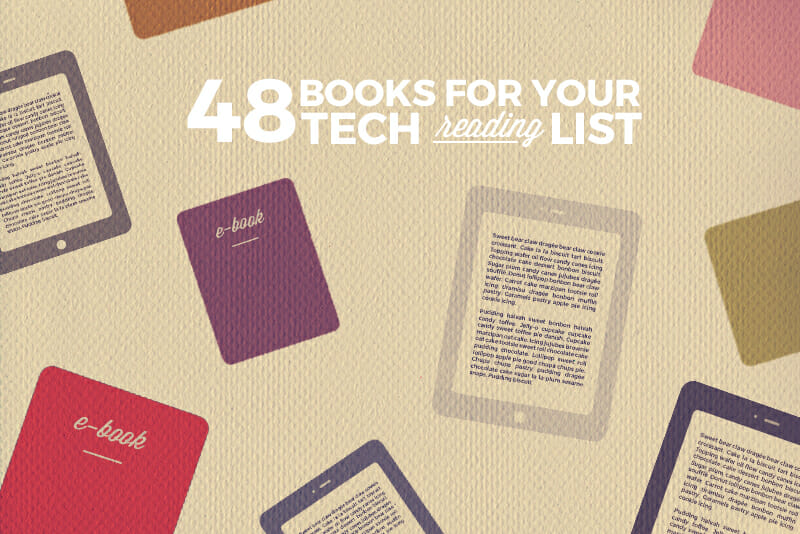48 Books to Add to Your Tech Reading List
48 Must-Read Books for Getting Into Tech In the New Year


I’ve spent years in the tech world, as a designer, sometimes-developer, and mostly as a writer. I devour new content wherever I can get it, but sometimes, no matter how valuable I find all that information, I want to dive deeper.
And not look at a computer screen.
Sure, reading a hundred blog posts about what makes a good website design or a great blog post (#meta) is useful. The sheer volume of what you can learn—for free!—on the Internet is astounding. But when you want to go really in depth and become an expert on a particular subject, there’s nothing like a good, old-fashioned book (or new-fangled ebook, if you’d prefer).
I can hear it now, “But…but…I don’t have time to read a bunch of books to become an expert! That’s why I’m reading a blog!” The good news is that you don’t have to read a ton of books. Even just one book a month can make a difference. You’d be surprised how many decisions right here at Skillcrush came about because of a book that sparked an idea.
It doesn’t matter if you want to be an expert web designer, developer, content marketer, or other techie, reading will help! And it doesn’t matter what stage of your career you’re in either, whether you’re a beginner or have been doing your tech thing for years.
Here are 48 different books (12 for each subject) that can make you an expert before 2016 is up!
Books for Designers
Content Strategy for the Web
Content Strategy for the Web, by Kristina Halvorson and Melissa Rach, is the go-to handbook for content strategy, used by companies around the world. It helps you realize the value of your content while planning for long-term success.
Don’t Make Me Think
Don’t Make Me Think Revisited: A Common Sense Approach to Web Usability, by Steve Krug, focuses on usability, specifically the principles of intuitive navigation and information design. It’s short and profusely illustrated, while also being witty, commonsensical, and eminently practical.
Rocket Surgery Made Easy
Rocket Surgery Made Easy: The Do-It-Yourself Guide to Finding and Fixing Usability Problems, by Steve Krug, spells out a streamlined approach to usability testing that doesn’t require a usability consultant who charges thousands. It’s a direct companion to Don’t Make Me Think.
Responsive Web Design
Part of the A Book Apart series, Responsive Web Design, by Ethan Marcotte, is a fundamental resource for every web designer. It teaches you how to craft a website that responds to your users’ needs to deliver a quality experience regardless of the size of the user’s screen.
ReWork
ReWork: Change The Way You Work Forever, by Jason Fried and David Heinemeier Hansson of Basecamp, talks about the shifting paradigm technology has made possible, and how anyone can work for themselves without working 80 hours a week or using up your entire life’s savings.
Seductive Interaction Design
Seductive Interaction Design: Creating Playful, Fun, and Effective User Experiences, by Stephen P. Anderson, looks at what motivates people to take actions. It shows how to create playful engagements, how emotions affect judgment and behavior, how to put people at ease through clear and suggestive language, and much more.
Steal Like an Artist
Steal Like an Artist: 10 Things Nobody Told You About Being Creative, by Austin Kleon, has a positive message and beautiful design that makes it a perfect manifesto for the digital age. It includes exercises and examples to put readers directly in touch with their artistic side.
The Elements of Typographic Style
The 20th anniversary edition of The Elements of Typographic Style, by Robert Bringhurst, combines practical, theoretical, and historical information about type and how to use it.
Designing with Web Standards
The third edition of the industry-shaking Designing with Web Standards, by Jeffrey Zeldman and Ethan Marcotte, covers improvements and challenges in the constantly-changing world of standards-based design.
HTML and CSS
HTML and CSS: Design and Build Websites, by Jon Duckett, is a full-color introduction to HTML and CSS basics. It offers a unique structure that lets you progress through the chapters in order or just dive into the topics of interest.
Neuro Web Design
Neuro Web Design: What Makes Them Click?, by Susan Weinschenk, discusses the psychology of why users do what they do. Why they fill out forms, why they buy products online, why they register on a site, and more.
Thinking with Type
Thinking with Type: A Critical Guide for Designers, Writers, Editors, & Students, by Ellen Lupton, is one of my personal favorites. It’s the definitive guide to using type in visual communication, and includes information on captions, font licensing, mixing typefaces, the use of small caps, and more.
Books for Developers
JavaScript and JQuery
If you want to be a front-end developer, you’ve got to learn JavaScript. JavaScript and JQuery: Interactive Front-End Web Development, by Jon Duckett, covers basic programming concepts, core elements of JavaScript, jQuery, and more.
JavaScript & jQuery: The Missing Manual
JavaScript & jQuery: The Missing Manual, by David Sawyer McFarland, talks about making your pages interactive, using animations and effects, collecting data with web forms, and a whole lot more.
Effective Python
Effective Python: 59 Specific Ways to Write Better Python, by Brett Slatkin, helps you write exceptionally robust, efficient, maintainable, and well-performing Python code. It covers algorithms, objects, collaboration, built-in modules, and other important topics.
Python Crash Course
Python Crash Course: A Hands-On, Project-Based Introduction to Programming, by Eric Matthes, is a fast-paced look at programming with Python that will have you writing programs and solving problems in no time. Create and customize simple web apps, work with data to create interactive visualizations, and make 2D games, among other awesome projects.
A Software Engineer Learns HTML5, JavaScript and jQuery
A Software Engineer Learns HTML5, JavaScript and jQuery: A guide to standards-based web applications, by Dane Cameron, will teach you everything you need to know to get started writing your own web applications using modern web technology. You only need a very basic knowledge of HTML (like what you’ll learn in our FREE Tech Terms Bootcamp!) and programming to understand it all.
Eloquent JavaScript
Eloquent JavaScript: A Modern Introduction to Programming, by Marijn Haverbeke, teaches the essential elements of programming, including syntax, control, and data; how to make basic web applications; and how to use the DOM effectively to interact with browsers, among other topics.
The Well-Grounded Rubyist
The Well-Grounded Rubyist, by David A. Black, is suitable for both beginners to Ruby and Ruby experts who want a better understanding on the way the language works. It goes from basic techniques to build your first Ruby application to more sophisticated topics like reflection and threading.
Head First Ruby
Head First Ruby, by Jay McGavren, has a visually rich format to engage your mind more than text-heavy books. It’ll teach you to be a more productive programmer through a hands-on learning experience.
Digging Into WordPress
Digging Into WordPress, by Chris Coyier and Jeff Starr, includes over 400 pages of excellent WordPress advice that’s perfect for beginners to experts. It has lots of code samples, a beautiful custom design, and even includes a lifetime subscription to updates.
Modern PHP
Modern PHP: New Features and Good Practices, by Josh Lockhart, teaches you how to find, use, and create PHP components; modern PHP features, such as namespaces, traits, generators, and closures; and much more.
Coders at Work
Coders at Work: Reflections on the Craft of Programming, by Peter Seibel, talks about how successful programmers tackle their day-to-day work, plus how they became great programmers and the kinds of problems they find most interesting.
Cracking the Coding Interview
If you’re searching for your first tech job, Cracking the Coding Interview: 150 Programming Questions and Solutions, by Gayle Laakmann McDowell, is a must-have resource. You’ll get great practice with the types of coding questions (and solutions) you’re likely to encounter at any web developer interview.
Books for Marketers
Growth Hacker Marketing
Growth Hacker Marketing: A Primer on the Future of PR, Marketing, and Advertising, by Ryan Holiday, dissects how some of the biggest brands online have never spent a penny on traditional marketing, and how they rely on growth hacking instead.
Jab, Jab, Jab, Right Hook
In Jab, Jab, Jab, Right Hook: How to Tell Your Story in a Noisy Social World, by social media expert Gary Vaynerchuk, explains how the context in which communication happens has become more and more important, and about how you have to develop high-quality content that’s perfectly adapted to specific social media platforms and mobile devices.
The New Rules of Marketing and PR
The fifth edition of The New Rules of Marketing and PR: How to Use Social Media, Online Video, Mobile Applications, Blogs, News Releases, and Viral Marketing to Reach Buyers Directly, by David Meerman Scott, gives you a step-by-step plan for making the most of modern marketing and PR tactics to directly communicate with buyers and increase your sales.
DotCom Secrets
DotCom Secrets: The Underground Playbook for Growing Your Company Online, by Russell Brunson, teaches you how low traffic and conversion numbers are usually just a symptom of a bigger problem. The good news is that it’s easier to fix the real problems.
Platform
Platform: Get Noticed in a Noisy World, by Michael Hyatt, offers down-to-earth advice for building and expanding a powerful platform from one of the best business bloggers in the world. It’s a step-by-step guide that takes readers into the new world of social media success.
The Art of Social Media
The Art of Social Media: Power Tips for Power Users, by Guy Kawasaki and Peg Fitzpatrick, is the essential guide to social media that ensures you’ll get the most bang for your time, effort, and money. It includes over a hundred tips, tricks, and insights.
Unleashing the Ideavirus
Unleashing the Ideavirus, by Seth Godin, details how companies like Hotmail and Napster unleashed “idea viruses”: customer-to-customer conversations. It shows you how you can create your own idea virus to succeed in a world that doesn’t want to hear from traditional marketeers anymore.
Crossing the Chasm
Crossing the Chasm, 3rd Edition: Marketing and Selling Disruptive Products to Mainstream Customers, by Geoffrey A. Moore, is the bible for bringing cutting-edge products to larger markets. The third edition includes dozens of new examples of successes and failures, new strategies for marketing in the digital world, and current insights and findings.
Zag
Zag: The Number One Strategy of High-Performance Brands, by Marty Neumeier, tells you exactly why “me-too” brands are doomed to fail, how to read customer feedback, and the four deadly dangers faced by brand portfolios, among a ton of other important topics for setting your brand apart.
Your Marketing Sucks
Your Marketing Sucks, by Mark Stevens, guides the reader through the principles of business-building marketing. Marketing is always the primary force driving business growth, but too often it’s poorly designed and executed.
Purple Cow
Are you remarkable or invisible? Purple Cow, New Edition: Transform Your Business by Being Remarkable, by Seth Godin, urges you to create something truly unique, a “purple cow”—something phenomenal, counterintuitive, exciting, and flat-out unbelievable.
Agile Marketing
Agile Marketing: How to Innovate Faster, Cheaper and with Lower Risk, by Anthony Freeling, helps ensure your marketing is faster, cheaper, and less risky. It describes how to use a continuous process of fast, practical “test, learn and commit (TLC) loops” to create marketing offers that work.
Books for Content Creators
The Corporate Blogging Book
The Corporate Blogging Book, by Debbie Weil, is a smart, witty, and accessible guide to professional blogging. Weil shows you how to write a compelling corporate blog that will increase sales, and clarifies the ROI of blogging, in case you aren’t sure if it’s worth it.
Global Content Marketing
Global Content Marketing: How to Create Great Content, Reach More Customers, and Build a Worldwide Marketing Strategy that Works, by Pam Didner, teaches you how to engage customers from around the world. It takes you step-by-step through the process of creating and refining your strategies to reach and engage customers regardless of national borders.
Everybody Writes
Everybody Writes: Your Go-To Guide to Creating Ridiculously Good Content, by Ann Handley, is the go-to guide for creating content to make your business thrive. It includes fundamentals of 17 specific kinds of content that marketers are often tasked with crafting.
How to Shoot Video That Doesn’t Suck
90% of American homes have some kind of video, and 24 hours of content is uploaded to YouTube every minute. How to Shoot Video That Doesn’t Suck: Advice to Make Any Amateur Look Like a Pro, by Steve Stockman, helps you create awesome video content that you can be proud to show the world.
Blog, Inc.
Every 24 hours, an estimated 95,000 blogs are launched worldwide. Blog, Inc.: Blogging for Passion, Profit, and to Create Community, by Joy Deangdeelert Cho, is an authoritative handbook that gives expert advice on starting and growing a blog.
Blogging for Creatives
With 80% of internet users visiting blogs, it’s vital for anyone marketing themselves online to get in on it. Blogging for Creatives: How Designers, Artists, Crafters and Writers Can Blog to Make Contacts, Win Business and Build Success, by Robin Houghton, tells you everything you need to know about how to design a beautiful, interesting blog that people will want to return to again and again. Plus info on how to design, publish, and host a blog.
ProBlogger
ProBlogger: Secrets for Blogging Your Way to a Six-Figure Income, by Darren Rowse and Chris Garrett, is vital reading for anyone who wants to create a blog that will make serious money. It reveals 20 key ingredients for a successful blog post, helps novices set up their blog, and offers solid, step-by-step instruction on how to make money, why niches matter, how to use essential blogging tools and take advantage of social media and content aggregators, and more.
On Writing
While not a traditional content marketing book, Stephen King’s On Writing: 10th Anniversary Edition: A Memoir of the Craft is a must-read for anyone who wants to create written content. It’s brilliantly structured, friendly, and inspiring, while also being a revealing and practical view of the writer’s craft.
Content Rules
Content Rules: How to Create Killer Blogs, Podcasts, Videos, Ebooks, Webinars (and More) That Engage Customers and Ignite Your Business by Ann Handley and C.C. Chapman, covers leveraging social media and tools to distribute your ideas as widely as possible, how to find an authentic voice, and understand why you’re generating content, among other ideas.
Epic Content Marketing
Epic Content Marketing: How to Tell a Different Story, Break through the Clutter, and Win More Customers by Marketing Less, by Joe Pulizzi, shows you how to cut through the noise, commotion, and bad information that is right now cluttering up your customers’ digital space. It explains how to draw prospects and customers in by creating information and content they actually want to engage with.
The Huffington Post Complete Guide to Blogging
The Huffington Post Complete Guide to Blogging, by the Editors of the Huffington Post, is an A to Z guide to all things blogging. It gives you information to help you build your blog, strategies to create your community, tips on finding your voice, and anecdotes from actual bloggers.
How to Create Awesome Content
If you want to create epic blog posts but don’t know where to start, How to Create Awesome Content: Blog Post Ideas That Get Results, by Mike Fishbein, is the book for you. It shows you how to stand out from the millions of other blogs out there by creating blog posts that attract and convert.
Wanna go a little more in-depth with your learning? Then check out our Career Blueprints to get your start (or further your career) in tech!





